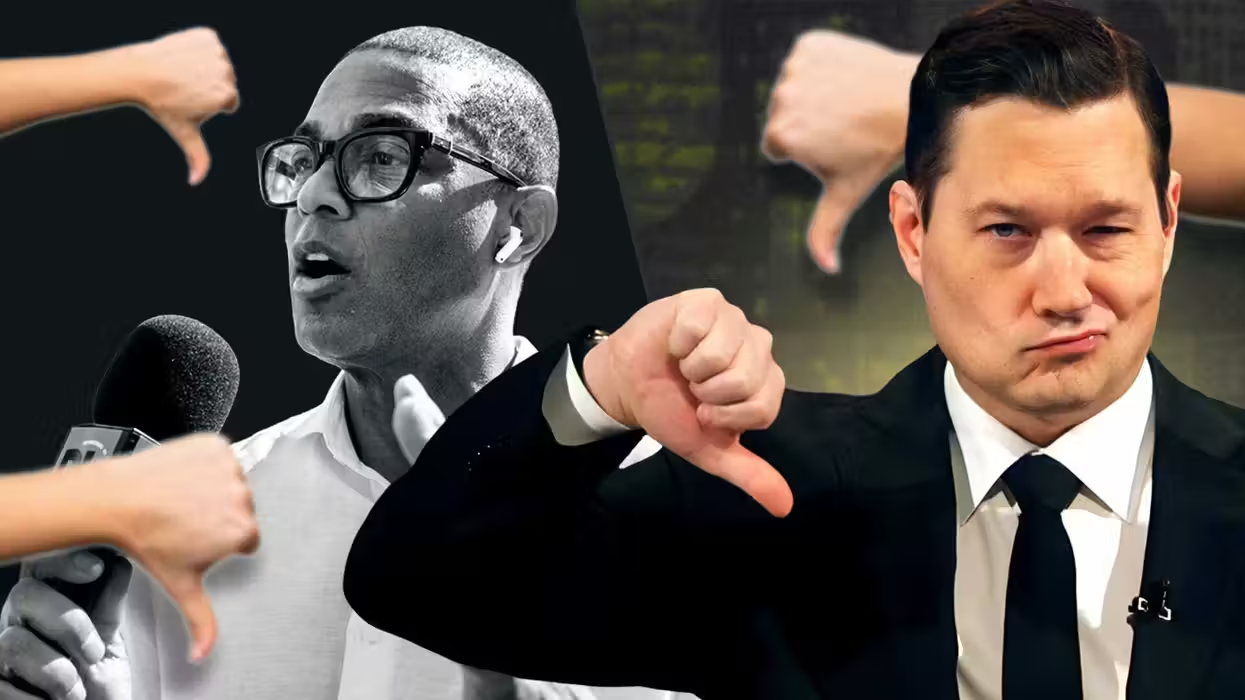
© 2026 Blaze Media LLC. All rights reserved.
Government Motors' CEO Complains of 'Lumbering Bureaucracy' During Interview
December 16, 2011
"Every corporation has to change, or it dies."
Dan Akerson was named to General Motors' board of directors by the U.S. Treasury in July 2009. He became CEO of GM in September 2010 and chairman in January 2011.
He was recruited by the federal government to join GM as the company was leaving bankruptcy protection. The government was majority owner at the time, and Akerson thought his management, financial and engineering expertise could help the car manufacturer.
However, despite these admittedly impressive skill sets, many thought that his recruitment to the GM board was odd because, well, he admitted he knew nothing about cars in the beginning.
“Akerson is not–and never has been–a car guy. He himself said so. What is he? He is a DC-connected, Wall Street hedge fund big coin guy,” writes Seton Motley of the Washington Examiner. “Akerson’s immediately preceding gig was Managing Director and head of Global Buyout for the incredibly inside-the-Beltway-connected Carlyle Group.”
So, maybe he wasn’t brought onboard GM just because he was really, really good with management. (Allegedly, that's all changed as he now “speaks with authority on everything from transmissions to batteries,” gushes the Associated Press.)
Akerson has also gained some notoriety for being a bit too candid during interviews. Recall that in earlier comments made to reporters, Akerson said that Ford should "sprinkle holy water" on its troubled Lincoln luxury brand, and that Toyota's Prius hybrid a "geek-mobile" (while these things may be true, they only become a headache for GM’s public relations team).
Now his most recent complaint is against GM’s “lumbering bureaucracy.”
"There is a resistance to change," at GM, Akerson recently told The Associated Press.
Akerson, who often uses military metaphors, spoke with The Associated Press in New York about the car industry, the economy, his management style and the future of electric cars. Excerpts appear below, edited for length and clarity.
Here are some excerpts from the interview:
Q: Would you recall all 6,000 Volts to strengthen the battery?A: If we find that is the solution, we will retrofit every one of them. By the way, if someone wants to sell it back to us now, we'll take that too. We're quite confident that we'll find a solution.
Q: Do you think the news about the Chevy Volt will harm sales of electric vehicles?
A: This car is safe. There is nothing happening immediately after the crash. I think in the interest of General Motors, the industry, the electrification of the car, it's better to get it right now, when you have 6,000—instead of 60,000 or 600,000—cars on the road. We're not the only car company that has liquid cooled batteries out there. There are many. So we think this is the right thing to do for our customers, first and foremost, and it was the right thing to do for General Motors and the industry [emphasis added].
Speaking of “the right thing to do for our customers,” why didn’t GM mention the exploding-battery problem sooner?
Q: Are you moving past the early technology adopters on the Volt at this point, or has any data surprised you on who is actually buying this vehicle?A: The average purchaser of a Volt is earning $170,000 a year...
[Editor's note: Is he admitting that GM knowingly markets its product to the “very wealthy”? Wait until Occupy hears about this.]
Some of them — I think roughly half — are either Prius or BMW owners. So one, you could say Prius owners were probably early adopters in the olden days, but that's kind of passed through. But BMW people want styling, good design, and an innovative powertrain, or power source, and I think Volt is a game changer. And quite frankly that's one reason we want to kind of clear the decks here.As you may remember, in the early days of Lexus, there were real issues surrounding quality. And they called back 8,000, reworked them, and put them back out. People don't remember that because Lexus is a great car, it's a great brand. I think it demonstrated that Toyota was sensitive to their customers' needs, perceptions, and safety, and it was an analog to what we wanted to follow here.
One could argue that the entire time Lexus has existed as a brand, it has never had to deal with the type of problems electric cars face. One could argue that the reason Toyota was able to revive the Lexus brand and make it a successful competitor in the market was because the problems it faced were relatively surmountable.
Q: How has the corporate culture changed at GM since you joined the board?A: I would say, objectively...90 percent of what we did was good. There is tremendous commitment and loyalty to this company. But it's that the 10 percent or 5—I don't know how to quantify it precisely—we failed.
Recognize what went wrong, learn from it, move on . . . I don't want to obsess on it, but I want to learn from it. And that's the mantra that we have as a team.
So I would say we're making good progress, we're doing surveys on people. What do they see right? What do they see wrong? How do they view the management? We want to know…
I wasn't used to such a command-and-control. I said "We've really got to make Cadillac a global brand." Next thing I know, go to the Geneva (auto) show and we have North American cars, no right-hand drive, no diesel sitting there, and you're going like, "Oh God, why didn't we do that?" ''Well, you said you wanted to make it a global brand" . . . You don't have right-hand drive, you don't have diesel, you're no good in Europe.
You know who would have thought of that? Perhaps a "car guy."
Q: If you could wave a magic wand, what two things would you change at GM right now?A: I want a miracle solution on Volt in the next week...I want sustainable, differentiable product.
The second thing is, we've got to make sure that the culture evolves to one that's less hierarchal, flatter, more interactive, more participative.
Q: What makes you the maddest as a CEO?
A: There is a resistance to change...
Every corporation has to change, or it dies. You lose your competitive edge. There's a real strong competitive gene at General Motors. I would say you have to meet the market on its terms, you cannot dictate to the market. I don't like where our stock is. Well, what can I do about it? Execute on the fundamentals and the market will change and appreciate that. But at the end of the day, you have to create a culture that not only accepts change but seeks out how to change...
Q: Is there no longer a stigma about going to work at GM?
A: I don't think so. We are getting good young people. People want to work for us. For example, when I got there, when we thought about OnStar, we thought about safety and security. Now we've amalgamated that with infotainment. And it's now starting to draw people out of Silicon Valley...
Q: How long do you plan on staying at GM?
A: I bought a condo in Detroit. I like the company. I like the city. I like the industry and I guess as long as I'm having fun and the board wants me, the management is willing to follow, I'll stay.
Want to leave a tip?
We answer to you. Help keep our content free of advertisers and big tech censorship by leaving a tip today.
Want to join the conversation?
Already a subscriber?
more stories
Sign up for the Blaze newsletter
By signing up, you agree to our Privacy Policy and Terms of Use, and agree to receive content that may sometimes include advertisements. You may opt out at any time.
Related Content
© 2026 Blaze Media LLC. All rights reserved.
Get the stories that matter most delivered directly to your inbox.
By signing up, you agree to our Privacy Policy and Terms of Use, and agree to receive content that may sometimes include advertisements. You may opt out at any time.






